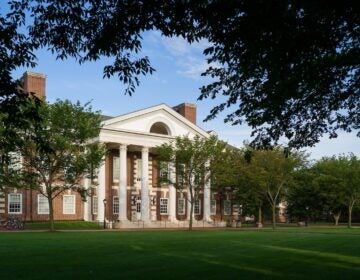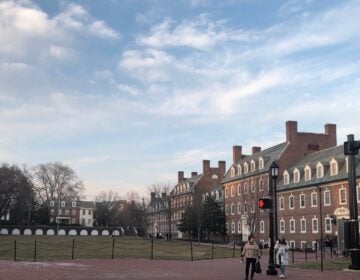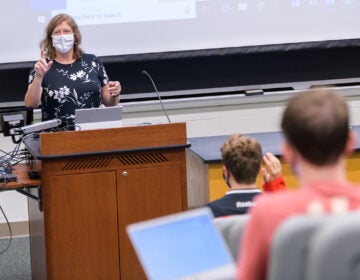Delaware Gov. Carney declares state of emergency, puts National Guard on alert
The governor took swift action after four coronavirus cases were confirmed at the University of Delaware. The state legislature also postponed next week’s sessions.
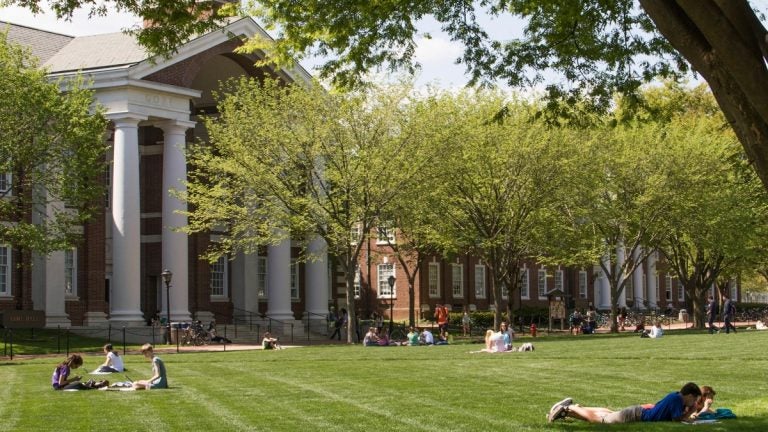
The campus at University of Delaware. (University of Delaware)
Updated at 4:10 p.m.
Gov. John Carney declared a state of emergency after four positive cases of coronavirus were confirmed at the University of Delaware “to prepare for the spread” of the disease.
The state of emergency becomes effective at 8 a.m. Friday and directs the Delaware National Guard “to take precautionary and responsive actions to assist with Delaware’s response,’’ Carney’s office said in a news release.
Carney’s move also:
- Advises event organizers to “cancel non-essential public gatherings of 100 people or more.”
- Prohibits price-gouging, or excessive prices increases, during the outbreak.
- Allows the state government to conduct public meetings electronically.
“We are taking this situation extremely seriously,” Carney said. “We have been expecting positive cases in Delaware, and for the last two months we have prepared our state’s response in close coordination with the experts at the Delaware Division of Public Health and the Delaware Emergency Management Agency.”
Carney also echoed health experts by urging people to wash their hands, cover their cough and stay home from work or school when sick.
“It’s especially important for at-risk populations, specifically elderly Delawareans, to avoid large gatherings,’’ he said.
The declaration does not require schools or businesses to close their facilities, or close state office buildings.
The state is also recommending all nursing homes put a hold on all visitors as a way to reduce the risk to residents. The same advice applies to long-term care facilities and adult day care centers.
COVID-19 is much more likely to cause serious illness to older people, according to early data from the Centers for Disease Control and Prevention. The state Department of Health and Social Services is encouraging those facilities to monitor any staff who may show signs of respiratory illness, fever or sore throat.
Lawmakers postpone session
Delaware lawmakers will not resume their legislative session as scheduled next week. The General Assembly was to restart their work in Dover following a six-week break for budget hearings. Instead, legislators will postpone their work until at least March 24.
“We believe delaying our return is the right decision to ensure the safety of our staff, fellow lawmakers, and members of the public who visit Legislative Hall when we are in session,” said House Speaker Pete Schwartzkopf and Senate President Pro Tempore David McBride in a joint statement.
Legislative Hall will be closed to the public starting Friday. Every day, an average of 600 people visit the building, including staff, legislators, lobbyists, press and members of the public.
“We will carefully monitor the spread of COVID-19 in Delaware and across the country, and we will re-evaluate when to return to session on a weekly basis. As we have said before, this is a rapidly shifting situation and we must remain flexible based on the changing circumstances,” said Schwartzkopf and McBride.
Four positive coronavirus cases at UDel
Two graduate students and a postdoctoral researcher at the University of Delaware have tested positive for coronavirus, Delaware health officials announced late Thursday morning. In response, classes are canceled, meaning spring break is starting early.
All three people are under the age of 30. They had contact at an off-campus event with the UD professor in his 50s who was announced Wednesday as the state’s first coronavirus case.
State public health officials said none of the four patients are severely ill and all are currently self-isolated at home.
“The university continues to work closely with the Delaware Division of Public Health to track students, faculty and staff who were in contact with the individuals who have tested positive for coronavirus,” UD President Dennis Assanis wrote in a letter to the school community. “Members of our community who may have had close contact with them will be notified and evaluated by DPH.”
Assanis said any university spaces that may have been affected are being disinfected.
Dr. Karyl Rattay, head of the state Division of Public Health, said officials are “working closely with the administration at the University of Delaware on their coronavirus disease response.”
Anyone who had close contact with the patients should stay home for 14 days after their last contact with those patients. Those who did not have contact with them can go about their lives as normal, Rattay said. They should contact their primary care doctor if symptoms of COVID-19 start to appear.
In total, Delaware has tested 41 people for coronavirus with 23 of those tests coming back negative. There have been four positive tests. The state is awaiting results on the remaining 14 cases.
UD has responded by canceling classes for the rest of this week and starting spring break Saturday. The break was initially supposed to start March 28.
When classes resume March 23, they will be online until further notice, Assanis said.
Delaware State University in Dover is already on spring break and has asked students not to return to campus until April 5. Delaware State also will resume with online classes.
‘It’s kind of like … a disaster’
Newark’s Main Street, which bisects the UD campus, was mostly deserted Thursday morning.
Senior Katie Coulson and sophomore Rachel Orenstein were munching on muffins and lamenting the sudden disruption of their final semester.
Coulson supports the decision but when she attended class the previous evening “people were saying that could be my last class I ever take,’’ she said.
“It’s kind of like putting a damper on everything and everybody just doesn’t know what to do … People are saying graduation is going to be canceled so it’s kind of like just a disaster,” she said.
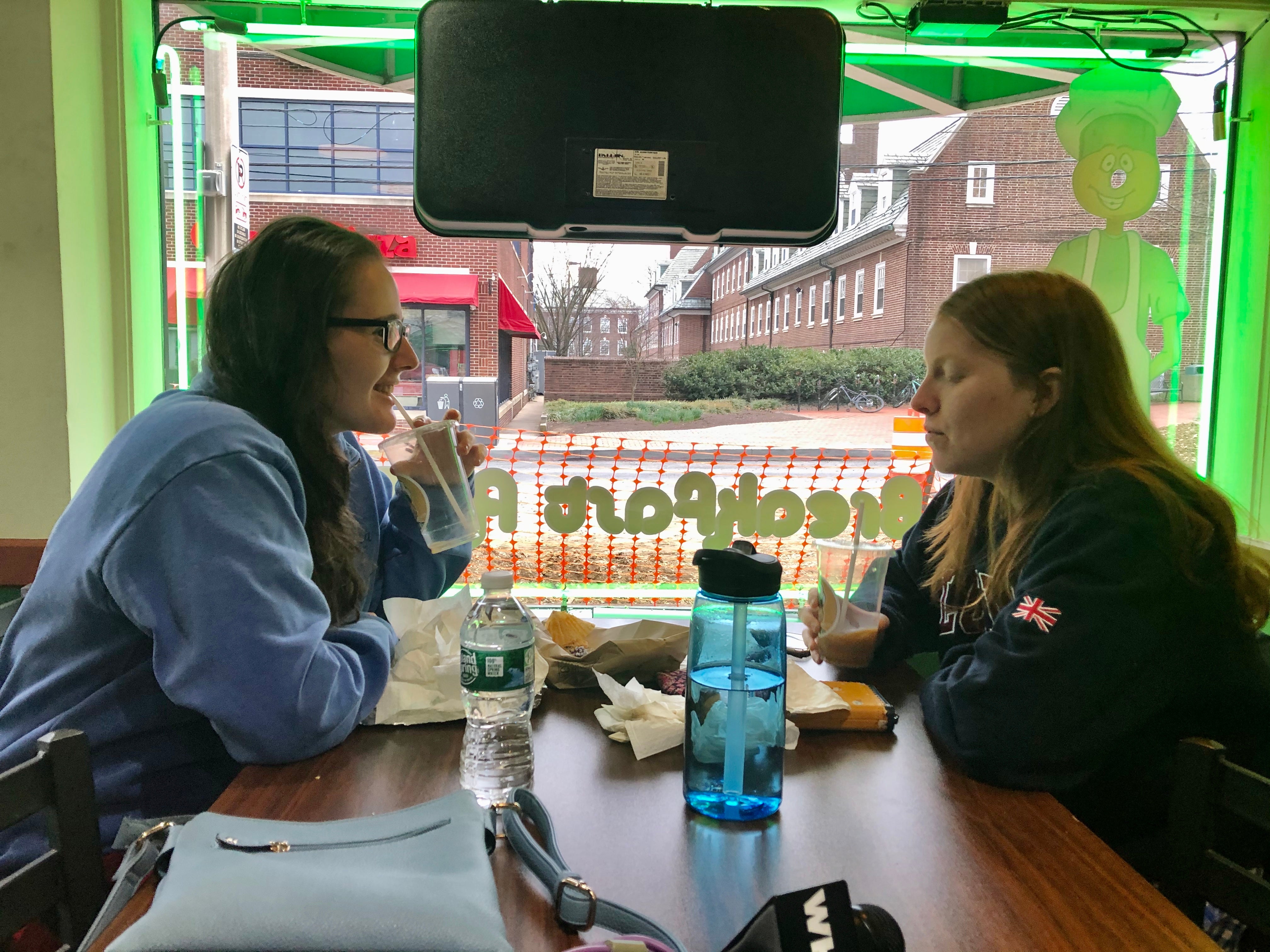
Orenstein was supposed to attend a conference at Temple University this weekend. That’s canceled too.
“I was freaking out because I was like I want to go but I would also have to take Amtrak, and public gatherings and XYZ,’’ she said. “And it’s insane how something so exciting could be turned around with this whole thing but it’s for the best.”

Wallace Moody, who works on a crew laying sewer lines on Main Street, said UD officials made the right call.
“I think it will be healthier around here,” Moody said. “Everybody might need to be quarantined for a minute, a week or two. They say it’s going to get worse before it gets better.”
WHYY is your source for fact-based, in-depth journalism and information. As a nonprofit organization, we rely on financial support from readers like you. Please give today.


![CoronavirusPandemic_1024x512[1]](https://whyy.org/wp-content/uploads/2020/03/CoronavirusPandemic_1024x5121-300x150.jpg)
